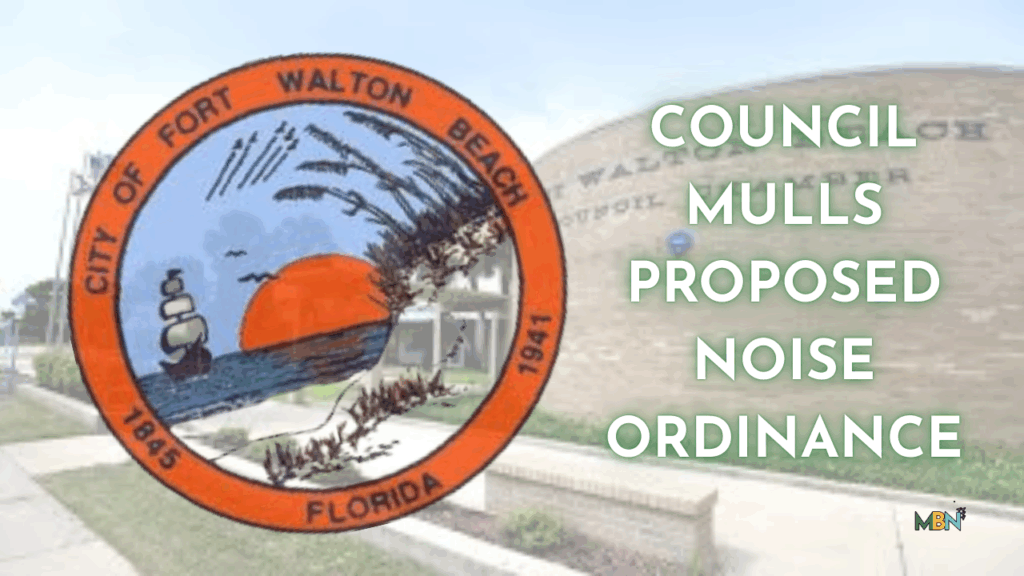
:
📢 New Standard: Fort Walton Beach plans to replace decibel meter rules with a “plainly audible” 50-foot standard for noise violations.
📝 Detailed Exemptions: The ordinance includes 33 specific exemptions, from city events to emergency operations and lawn maintenance.
🛑 Stronger Penalties: Repeated violations could lead to misdemeanor charges, fines up to $500, and possible jail time.
FORT WALTON BEACH — The Fort Walton Beach City Council on Tuesday approved the first reading of a sweeping rewrite of its noise ordinance, shifting enforcement from a decibel-meter standard to a “plainly audible” approach after police and legal staff said the city’s current rules were “effectively impossible to enforce.”
The unanimous vote came after more than 20 minutes of discussion and multiple amendments, reflecting a months-long push to respond to frequent complaints about noise in residential neighborhoods, along the waterfront, and in the downtown entertainment area.
City Attorney Jeff Burns said the proposal — Ordinance 2187 — would repeal and replace Chapter 9.06 of the city code. The existing ordinance, adopted in 2021, required officers to take 40 hours of specialized training and use a calibrated decibel meter, a process Police Chief Robert Bage said was vulnerable to courtroom challenges.
“Attorneys often impeach the training and methodology behind them,” Bage told the council. “Many jurisdictions have moved to an audible standard, which is what we’re presenting tonight.”
The “plainly audible” standard allows an officer or code enforcement investigator to cite a violation if a noise can be heard from 50 feet beyond the source property line, even if the specific words or lyrics cannot be discerned.
The proposed ordinance is similar to an ordinance passed within the City of Destin earlier this year. Still, those regulations say that noises up to 150 feet away from a property line can be cited for violations.
Bage said the new approach, combined with clearly defined exemptions and penalty steps, will be “a lot easier” to enforce than the current system, which he compared to “playing cat and mouse with an elephant versus a rat.”
The new ordinance spells out 33 specific exemptions, ensuring certain noises are always permitted when meeting listed conditions, such as:
Under the proposed ordinance, violations escalate in severity:
Each 15-minute continuation of a noise disturbance counts as a separate violation. Property owners, operators, and those making the noise can all be held liable.
Councilman Bryce Jeter said the ordinance “may not be perfect yet, but it’s better than what we had,” stressing the need to move forward rather than keep delaying for adjustments.
Councilman Logan Browning proposed reducing weekday noise hours in the downtown district from 2 a.m. to 11:59 p.m. Monday–Thursday, while keeping 2 a.m. Fridays and Saturdays.
The change mirrors Community Redevelopment District hours and was adopted without sending the ordinance back to first reading because it was less restrictive for some days.
Councilman David Schmidt added a “friendly amendment” to push the start time for allowable morning noise from 6 a.m. to 7 a.m. in specific neighborhoods, after a public request from a Beach Tree Drive resident.
Council members also debated how officers would measure 50 feet from a property line when lot sizes are small. Chief Bage explained that officers could use property appraiser records, right-of-way dimensions, or laser measuring devices, and that body-worn cameras could bolster an officer’s testimony in enforcement cases.
One resident supported the ordinance but called 6 a.m. “just early, period, in life.”
Mayor Nic Allegretto agreed, but noted that exemptions, including for lawn care, city-sponsored events, and permitted activities, can still allow earlier noise in some instances.
With a passage on first reading, the city council will host a second reading at a later date. If adopted, then the new rules, with all 33 exemptions, will take effect immediately upon the mayor’s signature.
Register or login with Mid Bay News and never get another pop up on our site!